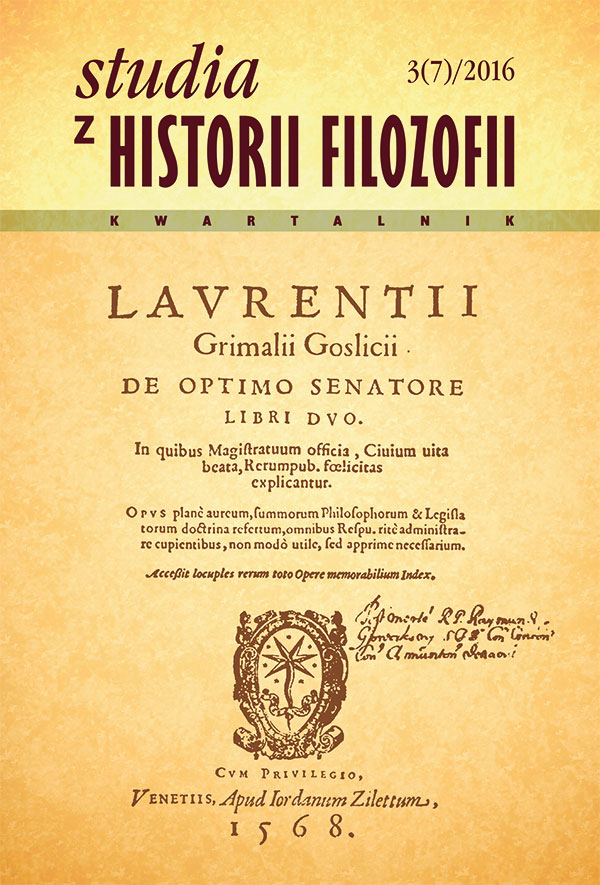Problem wpływu teozofii Jakuba Böhmego na idealistyczny system Georga Wilhelma Fryderyka Hegla
DOI:
https://doi.org/10.12775/szhf.2016.043Słowa kluczowe
teozofia, Hegel, Böhme, zachodnia ezoteryka, dialektyka, trójca święta, idealizm, mistykaAbstrakt
Związki między zachodnią ezoteryką i filozofią nowożytną głównego nurtu są niechętnie eksponowane przez wykształconych historyków filozofii. Ezoteryka jest przede wszystkim kojarzona z intelektualną szarlatanerią, która wielu z jej wyznawców sprowadziła na drogę herezji i duchowego wykluczenia ze świata chrześcijańskiego. Wybitni przedstawiciele filozofii europejskiej jednak nierzadko czerpali inspiracje z wiedzy ezoterycznej – G. Bruno i Spinoza z kabały czy F. W. J. Schelling z teozofii F. C. Oetingera. G. W. F. Hegel był prawdopodobnie świadom, że myśl ezoteryczna odegrała niebagatelną rolę w ukształtowaniu się nowożytnej metody naukowej. Dlatego w swoich Wykładach z historii filozofii poświęcił osobny rozdział J. Böhmemu, który w swojej teozofii dał podstawy pod nowocześnie pojmowaną dialektykę. Autor niniejszego artykułu dokonuje analizy porównawczej między wybranymi aspektami myśli Böhmego i Hegla, wskazując na wiele podobieństw strukturalnych w ich twórczości. Jednocześnie sugeruje, że koncepcja Böhmego mogła stanowić istotne źródło inspiracji dla Hegla, przede wszystkim we wczesnej fazie jego intelektualnego rozwoju.Bibliografia
Atala K., A Study of the Nature of Reality and Language in J. Boehme’s Aurora and G. W. F. Hegel’s „Vorlesungen ueber die Philosophie der Religion III” (dysertacja doktorska), Catholic University of America 1988.
Böhme J., Aurora oder Morgenröte im Aufgang 1612.
Böhme J., Betrachtung Göttlicher Offenbahrung, Amsterdam 1682.
Böhme J., Clavis Oder Schlüssel etlicher vornehmen Puncten und Wörter / so in allen des Authoris Büchern zufinden / deutlicher erkläret, Amsterdam 1682.
Böhme J., Mysterium Magnum, Oder Erklärung über das Erste Buch Mosis / Von der Offenbahrung Göttlichen Worts durch die drey Principia Göttliches Wesens / auch vom Ursprung der Welt und der Schöpffung, Amsterdam 1682.
Böhme J., Sześć punktów teozoficznych, przeł. Ś. F. Nowicki, PWN, Warszawa 2013.
Böhme J., Von wahrer Gellasenheit [w zbiorze pt. Christosophia, oder Weg zu Christo] 1621.
Bubbio D. P., Hegel, The Trinity, and the ‘I’, „International Journal for Philosophy of Religion” 2014, nr 2, s. 129–150.
Faivre A., Christian Theosophy, [w:] Dictionary of Gnosis & Western Esotericism, red. W. Hanegraaff, Brill, Leiden 2006, s. 258–267.
Haldane E., Böhme and His Relation to Hegel, „Philosophical Review” 1897, nr 2, s. 146–161.
Hegel G. W. F., Encyklopedia nauk filozoficznych, przeł. Ś. F. Nowicki, PWN, Warszawa 2013.
Hegel G. W. F., Fenomenologia ducha, t. 1, przeł. A. Landman, PWN, Warszawa 1963.
Hegel G. W. F., Fenomenologia ducha, przeł. Ś. F. Nowicki, Aletheia, Warszawa 2002.
Hegel G. W. F., Hegel’s Philosophy of Nature: Being Part Two of the Encyclopedia of the Philosophical Sciences (1830), Translated from Nicolin and Pöggeler’s Edition (1959), and from the Zusätze in Michelet’s Text (1847), Clarendon Press 1970.
Hegel G. W. F., Nauka logiki, t. 1, przeł. A. Landman, PWN, Warszawa 2011.
Hegel G. W. F., Nauka logiki, t. 2, przeł. A. Landman, PWN, Warszawa 2011.
Hegel G. W. F., O dialektyce, [w:] Hegel, T. J. Kroński, Wiedza Powszechna, Warszawa 1966.
Hegel G. W. F., Vorlesungen über die Geschichte der Philosophie III, E. Moldenhauer, K. M. Michel, Frankfurt am Main 1986.
Hegel G. W. F., Wykłady filozofii religii, t. 2, przeł. Ś. F. Nowicki, PWN, Warszawa 2007.
Hegel G. W. F., Wykłady z filozofii dziejów, t. 2, przeł. J. Grabowski, A. Landman, PWN, Warszawa 1958.
Hegel G. W. F.,Wykłady z historii filozofii, przeł. Ś. F. Nowicki, t. 3, PWN, Warszawa 2013.
Hodgson P. C., Hegel and Christian Theology: A Reading of the Lectures on the Philosophy of Religion, Oxford University Press 2005.
Hoffemeister J., red., Dokumente zu Hegels Entwicklung, Fromann, Stuttgart 1936.
Jaschke W., Die Vernunft in der Religion: Studien zur Grundlegung der Religionsphilosophie Hegels, Frommann-Holzboog 1986.
Magee G. A., Hegel’s Reception of Jacob Boehme, [w:] An Introduction to Jacob Boehme. Four Centuries of Thought and Reception, red. A. Hessayon, S. Apetrei, New York 2014, s. 224–243.
Magee G. A., The Hegel Dictionary, New York 2010.
Mayer P., Jena Romanticism and Its Appropriation of Jacob Boehme, Montreal 1999.
McGrath S., Boehme, Hegel, Schelling, and the Hermetic Theology of Evil, „Philosophy & Theology” 2006, nr 18, s. 257–286.
O’ Regan C., The Heterodox Hegel, SUNY Press 1994.
Piórczyński J., Absolut, człowiek, świat: studium myśli Jakuba Böhmego i jej źródeł,
PWN, Warszawa 1991.
Redding P., Hegel’s Philosophy of Religion, http://paulredding.net/pubs2009andearlier/
Redding_Hegels-Philosophy-of-Religion.pdf – dostęp 23.08.2015.
Rosenkranz K., Hegels ursprüngliches System 1798–1806, „Literarhistorisches Taschenbuch” 1844, nr 2, s. 157–164.
Schneider H., Anfänge der Systementwicklung Hegels in Jena, „Hegel-Studien” 1975, nr 10, s. 133–171.
Schussler I., Boehme und Hegel, „Jahrbuch der Schleischen Friedrich Wilhelms Universität” 1965, nr 10, s. 45–58.
Walsh D., The Esoteric Origins of Modern Ideological Thought: Boehme and Hegel (dysertacjadoktorska), University of Virginia 1978.
Walsh D., The Historical Dialectic of Spirit: Jacob Boehme’s Influence on Hegel, [w:] History and System: Hegel’s Philosophy of History, red. R. L. Perkins, Albany, New York 1984, s. 15–46.
Pobrania
Opublikowane
Jak cytować
Numer
Dział
Statystyki
Liczba wyświetleń i pobrań: 1356
Liczba cytowań: 0



